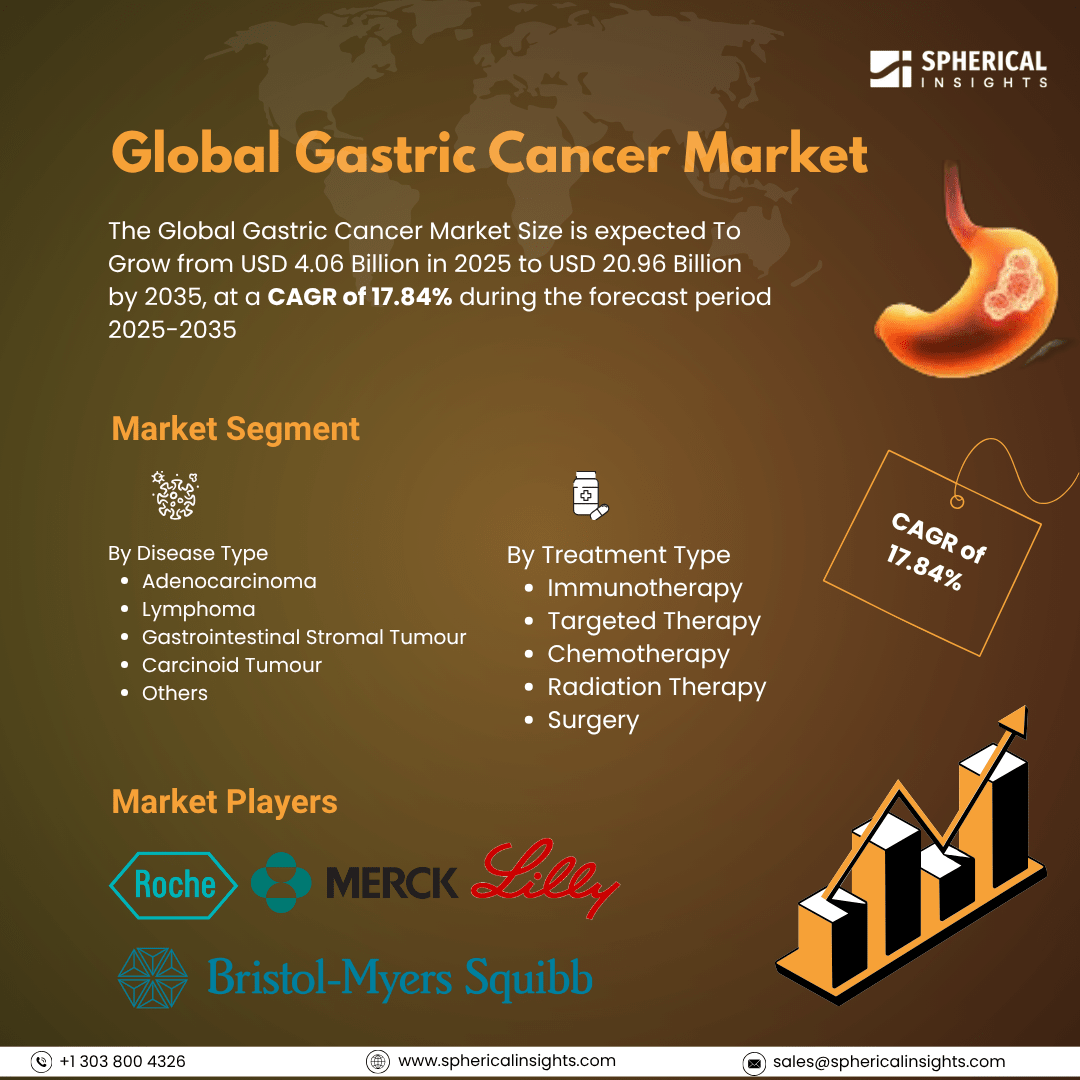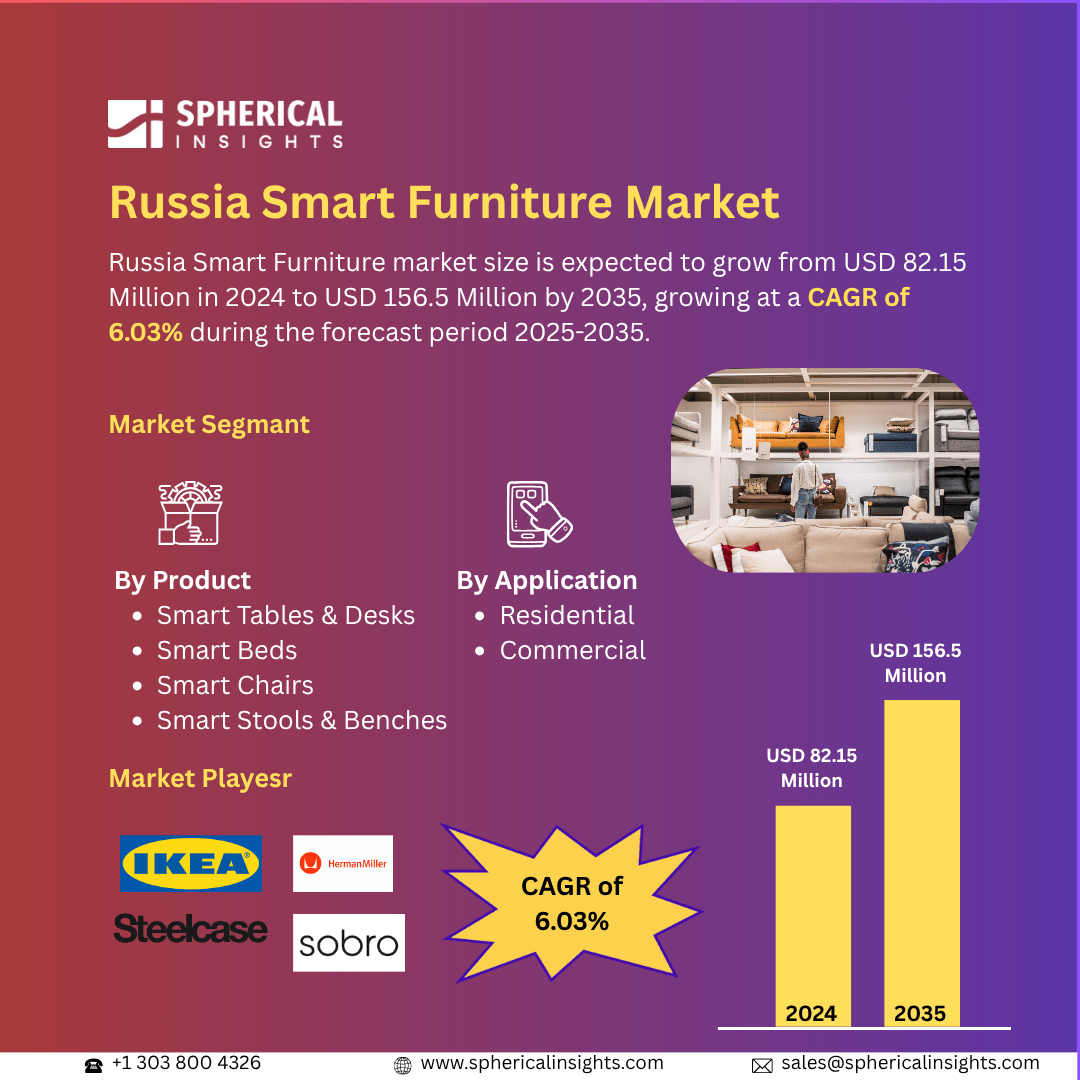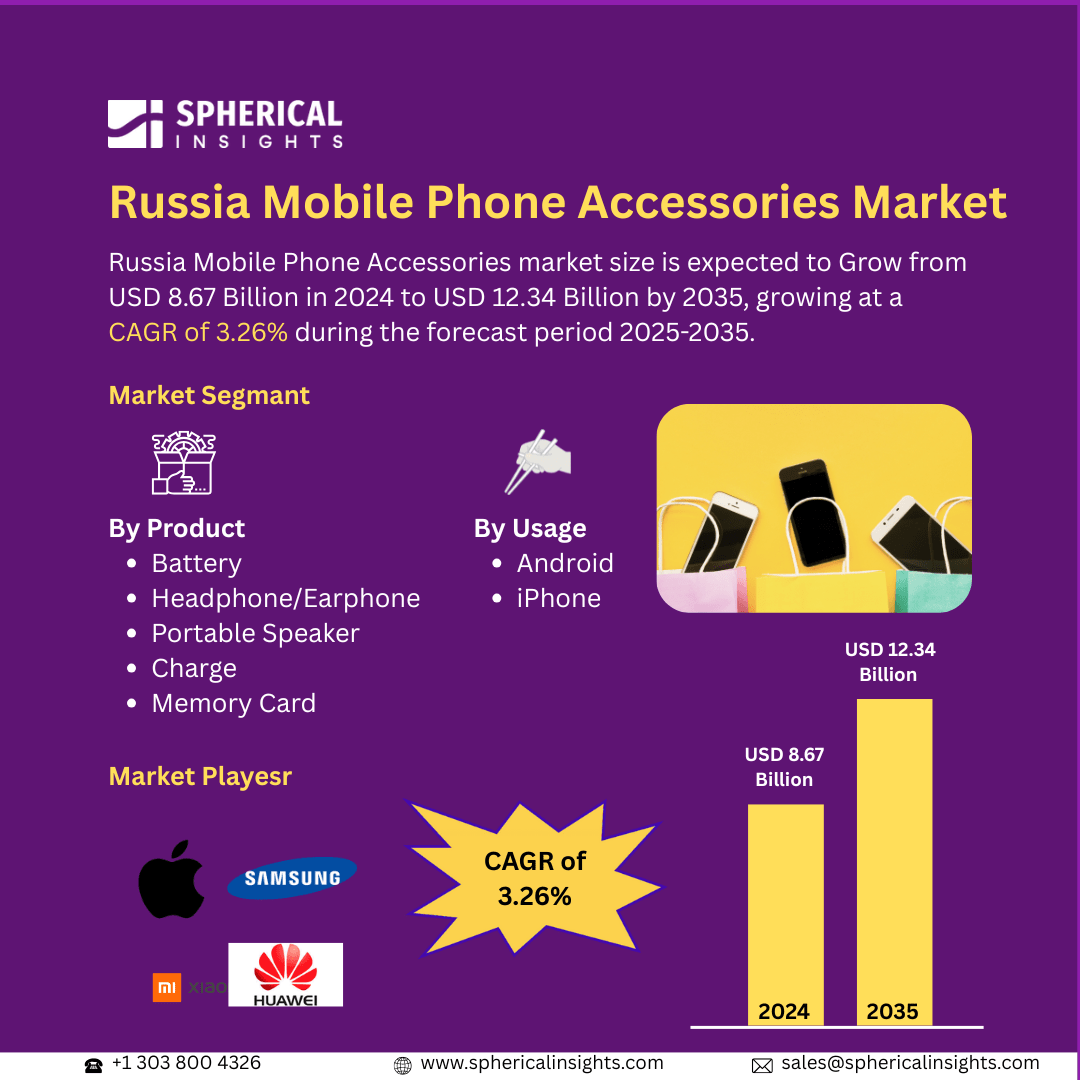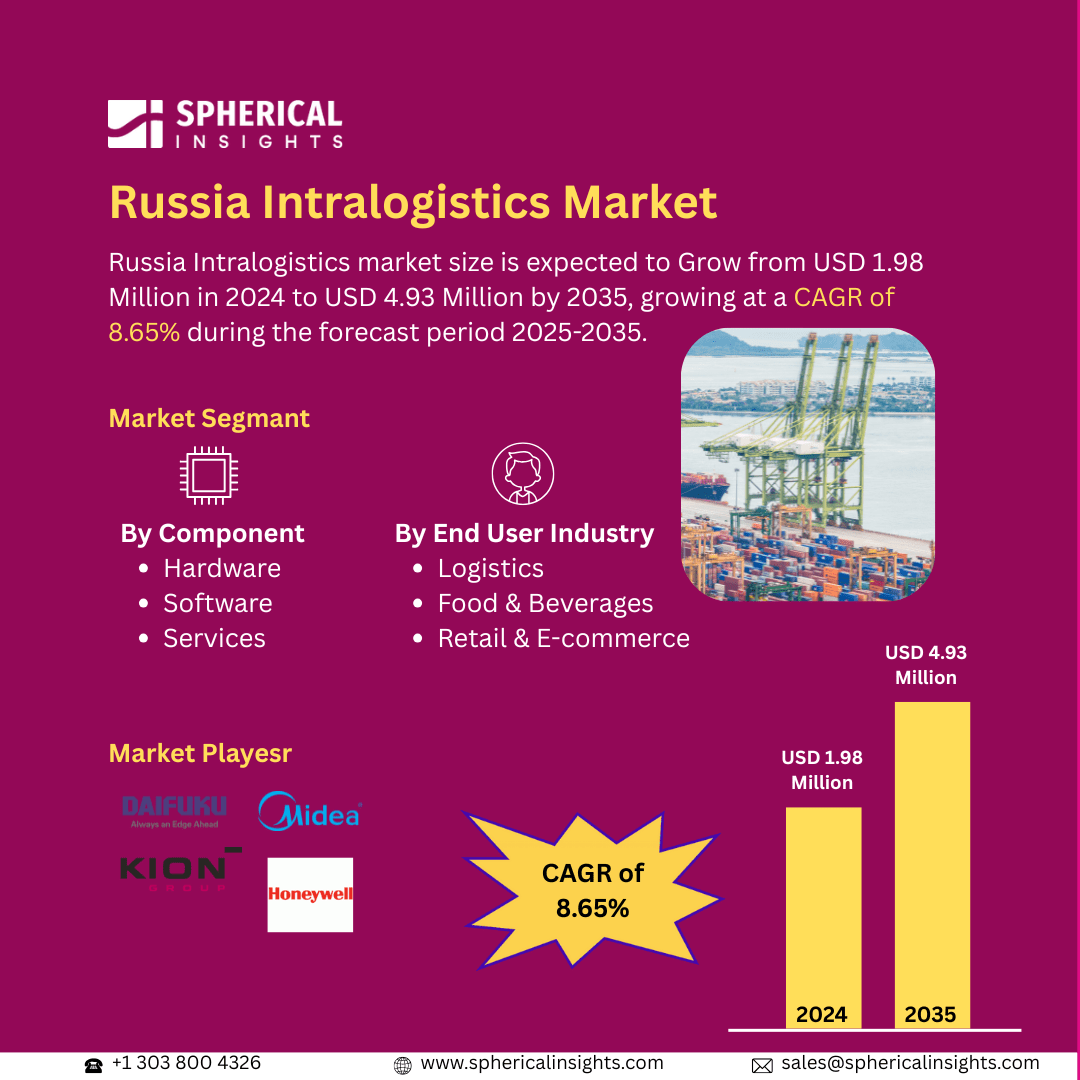- As per Spherical Insights & Consulting, The Global Gastric Cancer Market Size is expected To Grow from USD 4.06 Billion in 2025 to USD 20.96 Billion by 2035, at a CAGR of 17.84% during the forecast period 2025-2035, owing to the launch of new therapies in the market and the rise in the number of cases.
-
The leading Gastric Cancer Market Companies such as F. Hoffmann-La Roche, Eli Lilly and Co., Merck and Co. (Keytruda), Bristol-Myers Squibb, AstraZeneca, Pfizer, Novartis, Sanofi, Takeda, GlaxoSmithKline, Amgen, Otsuka Pharmaceutical, Daiichi Sankyo, Biocon, Celltrion, and Others
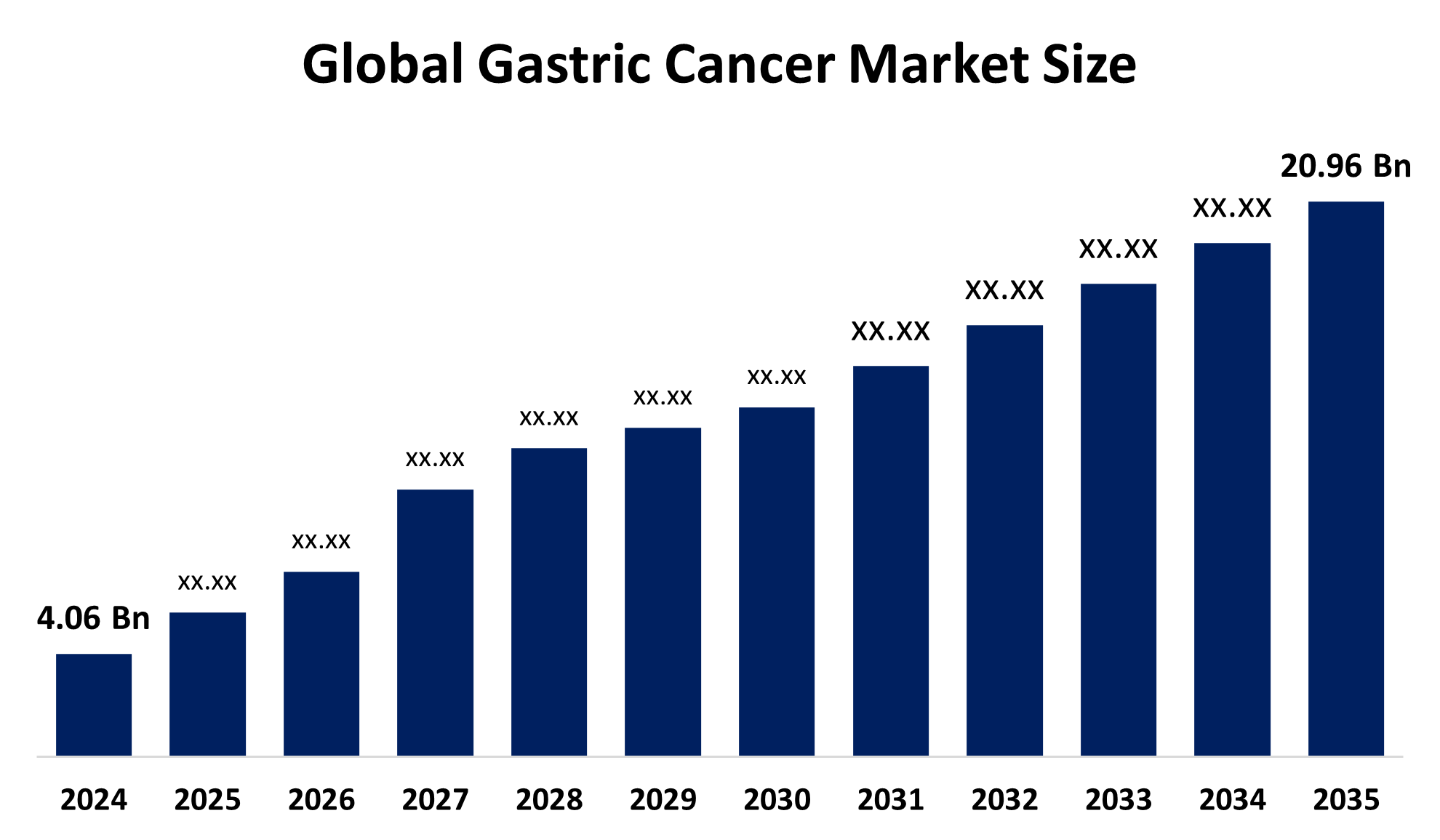
Gastric Cancer Treatment Market: Understanding and Treatment Algorithm:
Gastric or stomach cancer occurs when malignant cells form in the stomach lining. Often caused by H. pylori infection, poor diet, or genetics, it typically develops slowly. Symptoms like indigestion, weight loss, or nausea appear late. Diagnosis involves endoscopy and imaging. Treatments include surgery, chemotherapy, and immunotherapy, especially in advanced or metastatic stages.
Gastric Cancer Diagnosis:
Gastric cancer is diagnosed through endoscopy, where a camera examines the stomach lining, and a biopsy confirms cancer cells. Imaging tests like CT or PET scans assess spread. Blood tests detect anaemia or tumour markers. A barium swallow highlights abnormalities, while laparoscopy may be used for staging. Early, accurate diagnosis is vital for effective treatment.
Gastric Cancer Treatment
Gastric cancer treatment depends on the stage and location of the tumor. Options include surgery to remove part or all of the stomach, chemotherapy to kill cancer cells, radiation therapy for localized control, and targeted drugs or immunotherapy for advanced cases. Multimodal approaches often improve outcomes. Early detection significantly increases treatment success and survival rates
Gastric Cancer Epidemiology
The disease epidemiology covered in the report provides historical as well as forecasted epidemiology segmented by Total Diagnosed Incident Population of Gastric Cancer, Gender-specific Diagnosed Incidence of Gastric Cancer, Type-specific Diagnosed Incidence of Gastric Cancer, Age-specific Diagnosed Incidence of Gastric Cancer, Diagnosed Incident Population based on Primary Site of Gastric Cancer, and Diagnosed Incident Population based on Histologic Classification of Gastric Cancer Tumour in the global market covering North America, Europe, Asia-Pacific, Latin America, the Middle East, and Africa from 2024 to 2035.
Principal Insights
This section offers a global overview of gastric cancer epidemiology in major markets worldwide.
Country Wise- Gastric Cancer Multiforme Epidemiology
- The epidemiology segment provides Gastric Cancer prevalence data and findings across key regions worldwide, including North America, Europe (Germany, France, Italy, Spain, and the United Kingdom), Asia-Pacific (including Japan), Latin America, the Middle East, and Africa.
Gastric Cancer Recent Developments:
In October 2024, the FDA approved zolbetuximab clzb (Vyloy) in combination with fluoropyrimidine and platinum-based chemotherapy for first-line treatment of adult patients with locally advanced, unresectable, or metastatic HER2-negative, CLDN18.2-positive gastric or gastroesophageal junction adenocarcinoma. Approval was based on SPOTLIGHT and GLOW trials demonstrating improved progression-free and overall survival.
Gastric Cancer Marketed Drugs:
Keytruda (pembrolizumab) is an anti-PD-1 monoclonal antibody that boosts the immune system’s ability to attack tumor cells. It’s FDA-approved for advanced or metastatic gastric cancer, used in first-line and later treatments based on PD-L1 expression.
- Enhertu: Daiichi Sankyo & AstraZeneca
Enhertu (trastuzumab deruxtecan) is an antibody-drug conjugate targeting HER2-positive gastric and gastroesophageal junction cancers. It delivers a cytotoxic agent directly to HER2-expressing tumor cells, improving survival in advanced cases.
- Vyloy (Zolbetuximab): Astellas Pharma
Vyloy is a monoclonal antibody targeting CLDN18.2, a protein expressed on certain gastric cancer cells. It’s approved in combination with chemotherapy for first-line treatment of CLDN18.2-positive gastric and GEJ adenocarcinoma.
Gastric Cancer: Emerging Therapies
- BNT327: It is a bispecific antibody in late-stage trials for gastric cancer. It targets two immune checkpoints to enhance T-cell activation and tumour response, aiming to improve outcomes in patients resistant to standard PD-1/PD-L1 therapies.
- DS-8201 (Enhertu) Next-Gen: A next-generation antibody-drug conjugate designed to target HER2-positive gastric cancers with improved efficacy and reduced toxicity. It’s being evaluated in combination with immunotherapies in ongoing clinical trials.
- CAR-T Therapy (CLDN18.2-targeted): A novel chimeric antigen receptor T-cell therapy targeting CLDN18.2 on gastric cancer cells. Early trials show promising results in advanced gastric cancer resistant to conventional treatments.
- Margetuximab: It is a HER2-targeted monoclonal antibody designed to improve immune system engagement. It is being tested for HER2-positive gastric cancer, particularly in patients who have progressed on trastuzumab.
Gastric Cancer Market Outlook
- The gastric cancer market refers to the global industry involved in the development, manufacturing, and commercialization of diagnostic tools, drugs, and therapies for the detection, treatment, and management of gastric (stomach) cancer. It includes pharmaceuticals like chemotherapy, targeted therapies, immunotherapies, and surgical products aimed at improving patient outcomes.
- Key drivers of the gastric cancer market include rising incidence rates, increasing awareness, advances in targeted therapies and immunotherapies, growing investment in research and development, expanding healthcare infrastructure, and rising demand for early diagnosis and personalized treatment options to improve patient survival and quality of life.
- Emerging technologies like CAR-T and bispecific antibodies, expanding untapped markets in developing countries, growing adoption of precision medicine, increasing clinical trials for novel therapies, and improving diagnostic tools create significant growth opportunities in the gastric cancer market, promising better patient outcomes and market expansion.
- Government initiatives focus on funding research, promoting early screening programs, and improving access to advanced gastric cancer treatments to reduce mortality and enhance patient care worldwide.
- Challenges include late-stage diagnosis, limited treatment options for advanced disease, high treatment costs, drug resistance, and uneven access to healthcare facilities globally.
- The gastric cancer market is projected to grow significantly, driven by rising incidence rates, innovation in therapies, and increasing adoption of personalized medicine over the next decade.
Gastric Cancer Market Segmentation
By Disease Type:
- Adenocarcinoma
- Lymphoma
- Gastrointestinal Stromal Tumour
- Carcinoid Tumour
- Others
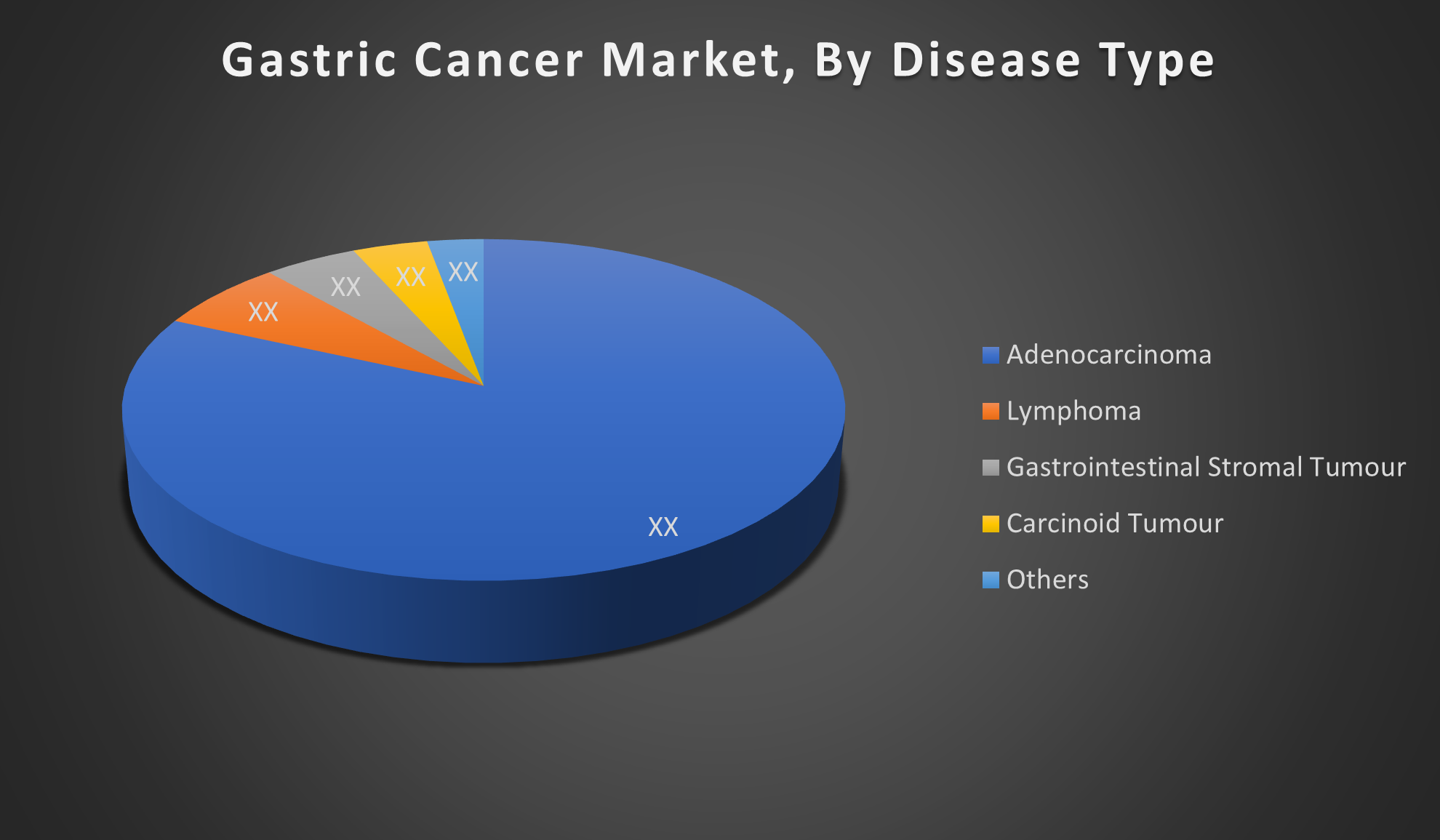
The Adenocarcinoma segment dominates the global gastric cancer market because it accounts for approximately 90-95% of all gastric cancer cases. Its high prevalence, aggressive nature, and poor prognosis drive significant demand for targeted therapies and treatment options, making it the primary focus of research, drug development, and market investment in gastric cancer care.
By Treatment Type:
- Immunotherapy
- Targeted Therapy
- Chemotherapy
- Radiation Therapy
- Surgery
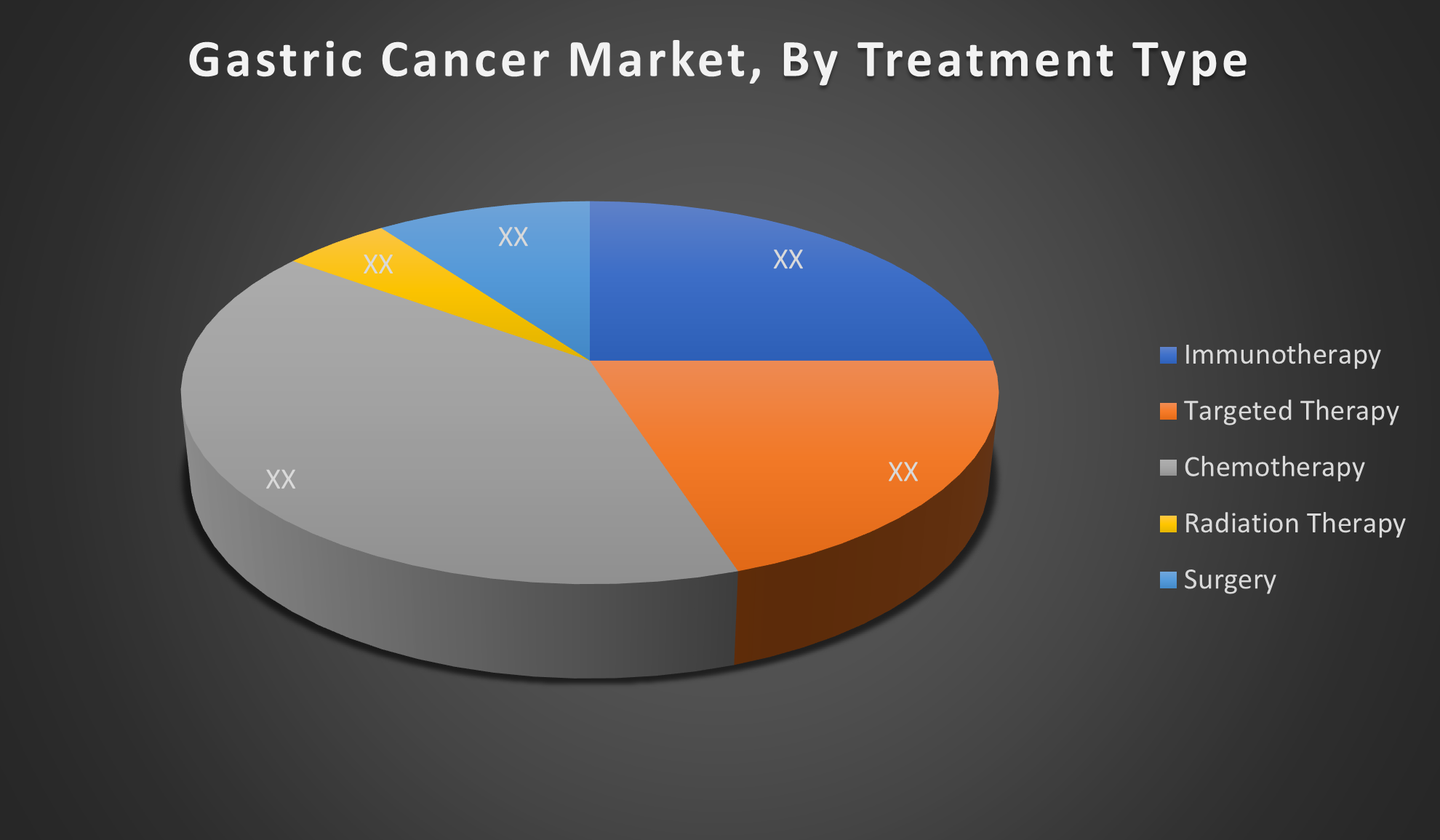
The Chemotherapy segment dominates the gastric cancer market due to its long-established role as a standard treatment across all cancer stages. It is widely used alone or combined with surgery, radiation, or newer therapies. Despite advances in immunotherapy and targeted treatments, chemotherapy remains essential for many patients, driving its continued market leadership and demand globally.
Regional Segment Analysis of the Gastric Cancer Market
The Asia Pacific region holds the largest share of the global gastric cancer market, largely due to the high prevalence of the disease in countries like China, Japan, and South Korea. Contributing factors include traditional dietary habits rich in smoked and salted foods, widespread Helicobacter pylori infections, genetic susceptibility, and a growing elderly population. Additionally, countries in this region benefit from relatively advanced healthcare infrastructure, government-supported cancer awareness initiatives, and well-established screening programs, particularly in Japan and South Korea. The presence of key pharmaceutical players and increased investment in research and development further reinforce the region's leadership in this market.
Europe is currently the fastest-growing region in the global gastric cancer market. This rapid growth is driven by an aging population, increased incidence of risk factors such as smoking and poor dietary habits, and rising awareness about early cancer detection. Enhanced government funding, expanded clinical research, and growing adoption of advanced therapies like immunotherapy and targeted treatments have also contributed to the market’s momentum. Furthermore, improved healthcare infrastructure and strong collaboration between pharmaceutical companies and regulatory bodies are accelerating access to innovative treatments, making Europe a key region for future expansion in gastric cancer care.
Gastric Cancer Market Key Companies
- F. Hoffmann La Roche
- Eli Lilly and Co.
- Merck and Co.
- Bristol Myers Squibb
- AstraZeneca
- Pfizer
- Novartis
- Sanofi
- Takeda
- GlaxoSmithKline
- Amgen
- Otsuka Pharmaceutical
- Daiichi Sankyo
- Biocon
- Celltrion
- Others
Gastric Cancer Therapeutics Market Report Scope
- The Gastric Cancer therapeutics market report provides a detailed overview, covering its causes, symptoms, disease progression, and existing treatment options.
- Detailed insights into Gastric Cancer’s epidemiology and therapeutic approaches are included.
- Additionally, a comprehensive review of existing and emerging Gastric Cancer therapies is provided, including an evaluation of new treatments expected to influence the current Gastric Cancer treatment market landscape.
- The report includes a detailed review of the Gastric Cancer therapeutics market, both historical and forecasted, highlighting the global drug reach.
- The Patient-Based Gastric Cancer Market Forecasting report offers valuable insights into trends shaping the global Gastric Cancer market, helping to develop effective business strategies.
Gastric Cancer Treatment Market Report Insights
- Forecasting Market Trends Based on Patient Data and Disease Rates
- Gastric Cancer Therapeutic Approaches in Gastric Cancer
- Review Of Drugs in Development for Gastric Cancer
- Market, Growth, and Trends in Gastric Cancer
- Market Opportunities in Gastric Cancer Treatment
- Effects Of Future Therapies on Gastric Cancer Treatment.
Gastric Cancer Treatment Market Report Key Strengths
- 15 Years Gastric Cancer Market Forecast
- Global Coverage
- Gastric Cancer Epidemiology Segmentation
- Key Cross Competition
Gastric Cancer Treatment Market Report Assessment
- Present Practices in the Gastric Cancer Treatment Market
- Review of Investigational Gastric Cancer Drugs
- Attractiveness of the Gastric Cancer Drug Market
- Gastric Cancer Market Drivers
- Gastric Cancer Market Barriers
- SWOT
- Attribute Analysis
Market Segment
This study forecasts revenue at the global, regional, and country levels from 2020 to 2035. Spherical Insights has segmented the gastric cancer market based on the below-mentioned segments:
Global Gastric Cancer Market, By Disease Type
- Adenocarcinoma
- Lymphoma
- Gastrointestinal Stromal Tumour
- Carcinoid Tumour
- Others
Global Gastric Cancer Market, By Treatment Type
- Immunotherapy
- Targeted Therapy
- Chemotherapy
- Radiation Therapy
- Surgery
Global Gastric Cancer Market, By Regional Analysis
- North America
- Europe
- Germany
- UK
- France
- Italy
- Spain
- Russia
- Rest of Europe
- Asia Pacific
- China
- Japan
- India
- South Korea
- Australia
- Rest of Asia Pacific
- South America
- Brazil
- Argentina
- Rest of South America
- Middle East & Africa
- UAE
- Saudi Arabia
- Qatar
- South Africa
- Rest of the Middle East & Africa
